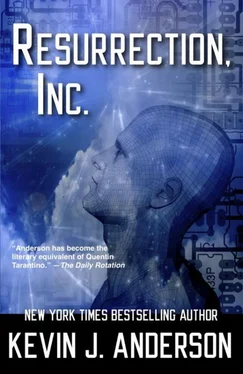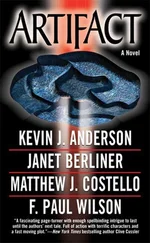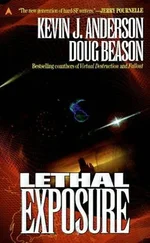“I’m fresh out of ideas. Come back some other day.” Stromgaard punched a few keys on the Net keyboard, initiating another game.
Vincent stepped into the study, and spoke up before the two older men could see him. “You could run a computer model on The Net. Have the system design the most viable new religion, given an up-to-date analysis of current events and social trends.”
His father turned away from the screen and scowled at him. “Vincent, go to your room.”
“No,” Nathans interrupted. “I’m in the mood for ideas.”
Giddy at what he was doing, Vincent continued. “I was listening, sorry. But The Net could analyze all the world’s religions, correlate the main theses that seem to have the most impact, the greatest chance of hooking new followers, and then we can put it into the context of modern-day society—create something new, but with all the good parts of the old.”
Nathans grinned at him with bright eyes. Vincent felt a warm flush, but kept his pride in check. Stromgaard turned away from the Net screen and let the video spaceships play by themselves for a moment before they all annihilated each other.
“You can’t do that,” his father said. “It’s much too complicated. We’d need an army of superhackers and programmers.”
“Give me ten minutes,” Vincent said and took his place at the keyboard. He canceled the game and stepped his way down through the menus. He paused and couldn’t resist turning to his father. “The Net is good for more than just games. You’d see that if you spent more time exploring it.”
He set a few datastrings in motion, building a broader relational file. “I’m going to run a lot of the tenets through a logic routine, and have it discard anything that really makes no sense at all.”
“Ah no, Vincent, you’re missing the point,” Nathans said. “I don’t want it to be believable , not believable in the least. There’s a larger plan at work here. I want to make our religion ridiculous, because I don’t want to mislead any intelligent people, the ones with even a modicum of potential in their cranial chambers. I want to lay a selective trap, something that only the terminally stupid will fall into. Intelligence is the only thing we’ve got that sets us apart from other animals, you know.”
Vincent blinked and nodded, but Nathans seemed to have launched into a well-rehearsed speech. “The popular religions are at the root of the problem, teaching people not to think for themselves on pain of losing their Eternal Salvation. ‘The world holds two classes of men—intelligent men without religion, and religious men without intelligence.’ A tenth-century Syrian poet wrote that.”
“Nobody will believe you,” Stromgaard said in a confident voice.
“Mankind’s track record says otherwise. Think of all the people who, despite utter and overwhelming proof to the contrary, still believe in magic apples and talking snakes to explain the creation of the world?”
“Oh, don’t even start, Francois,” Stromgaard sighed. “You’re going to give me a headache. And we’re not interested.”
“Let me make my case! I’ve done my homework because I intend to do something about this. If you’re going to help me, you have to understand my rationale.”
“Who says we’re going to help you?”
“Doesn’t it bother you that, just because the Bible happens to say the Sun goes around the Earth, the religious fanatics feel it’s their right to go out and burn astronomers at the stake for proving otherwise? It’s been done. Would you swallow a story about a fish swallowing a man, then spitting him out safe and sound three days later, never mind that the hydrochloric acid in gastric juices would eat through a tabletop in a few seconds?”
Vincent paused at the keyboard to listen, but then continued with his work, eager to show off his skill with The Net.
“It goes on and on, but let’s not just pick on Judeo-Christians,” Nathans continued. “What about Islam? One God omniscient and omnipresent, yet He seems to have a fine-tuning problem—He can’t hear your prayers unless your head points toward a particular latitude and longitude? How could anybody believe such things?”
“Like believing a man could rise from the dead?” Stromgaard retorted to the head of Resurrection, Inc., with a glint of triumph in his eye.
“Not without due process! Besides, it takes us a little longer than three days. Religion is like a wet blanket to the thinking man. In Seventeenth-Century Russia, the Eastern Orthodox Church went to war with itself over whether the faithful should make the sign of the cross using two fingers symbolizing God and Man, or three fingers for the Holy Trinity—thousands and thousands of people died in the struggle! It’s pathetically funny in a way.”
Stromgaard sighed. “That was centuries ago, Francois. It doesn’t matter anymore.”
“But it hasn’t changed! The Vatican just released an announcement that people no longer need to be actually present at the Pope’s Christmas Mass to receive his blessing, because ‘improvements in technology now allow us to transmit God’s forgiveness electronically.’ And the Moslems are all excited because they’ve developed a new selective disintegrator ‘for Allah’ that’ll let them remove the fingers and hands of thieves according to Islamic law, keeping the pain but doing away with all the mess.”
Nathans shook his head wearily, as if in despair. “Progress doesn’t enlighten people—it just makes them stupid in new ways.”
Stromgaard snorted, narrowing his eyes. “You’re going off on another one of your crusades, Francois. Years and years ago you were trying to solve the world’s crime problem, and what ever became of that? Now it’s religion. Next, you’ll be working on the world food shortage. You storm ahead and argue a lot and leave us all in the dust. Why not just give it a rest?”
Nathans looked at him with a sour expression. “You must have a problem with grandiose ideas, Stromgaard. I’m giving you something to think about. Mull it over. Expand your mind. It looks like you’re getting out of practice.” He glanced around the study. “Do you have something to eat?”
“No,” Stromgaard answered flatly.
Vincent turned while The Net continued to labor. “But if you want people to expand their minds, Mr. Nathans, what’s wrong with having them ponder metaphysical things, like religion?”
“Ah, Vincent, thinking about such questions is fine, but when philosophy becomes a religion , then people stop considering the ideas and pay more attention to following ritual. Once you’re convinced that you have The Word Of God, you stop bothering to think about the details. How could a Supreme Being ever be wrong? Then your brain begins to atrophy.”
Nathans ran a fingertip along his lip, thinking. “Maybe the Eastern religions… they’re not quite so preoccupied with their own importance. Hmmmm. No, take a look at Taoism—they happily worship gods of robbery and drunkenness, and take their pick from eighty-one different heavens, while the Buddhists, being much more conservative, limit themselves to a mere thirty-one heavens. No wonder they believe in reincarnation—a poor wandering spirit can’t figure out where else to go!
“Consider some, like Orthodox Judaism, that have stagnated in their rituals and symbols. They may as well just videotape their services and play them back year after year, generation after generation. Nothing ever changes. It’s always just the same mechanical gestures, the same memorized phrases. Nothing has been brought into the context of the modern world—do they think we’re all still shepherds in the Middle East? Are we still supposed to placate the old things that used to go bump in the night?” Nathans sat down, exasperated.
Читать дальше
Конец ознакомительного отрывка
Купить книгу












